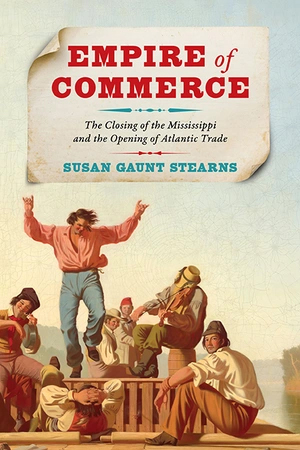Book Examines Mississippi River's Critical Role in Shaping Early US
Ole Miss historian explores river's 1784 closing and its impact on young America
OXFORD, Miss. – The early days of America are often told from the perspective of the East Coast, where George Washington and company forged a new country. But much of what made America actually originated on the mighty Mississippi River, a University of Mississippi professor argues in her new book.
Susan Gaunt Stearns, associate professor of history, has published "Empire of Commerce: The Closing of the Mississippi and the Opening of Atlantic Trade" (University of Virginia Press, 2024). In it, she explores how the Mississippi River – and trade along it – influenced a young country.
"This is not the traditional story," she said. "It really disrupts narratives of early America that focus on Massachusetts and Virginia, and it adds a lot of players to the story that aren't the traditional players we necessarily think about.
 "What I ultimately argue in my book is that the Mississippi River issue is hugely divisive and hugely important to the beginning of the country."
"What I ultimately argue in my book is that the Mississippi River issue is hugely divisive and hugely important to the beginning of the country."
Stearns began work on the book in 2008 as a part of her dissertation at the University of Chicago. One of the first things she learned was that the wild, wild West may not have been as far west as most believe.
"We all have these images in our head of a lawless wild West, right?" she said. "And we think, 'Oh, the wild West was Montana or Wyoming.' But actually, it turns out that by the time the United States started expanding across places like Montana and Wyoming, it already had a lot of legal systems in place for incorporating those regions."
The country's most lawless frontier was actually just over the Appalachian Mountains. That region included present-day Tennessee, Kentucky and states along the Mississippi River.
The river was the nation's first major highway. It provided means to transport agricultural goods grown in the farmlands of early America to the population centers that needed them. But control of the river belonged to Spain.
"In 1784, Spain closes the Mississippi River to American trade," Stearns said. "How do you close a river? ... Spain controlled New Orleans, and if they can control access to the port, they can prohibit people from tying up their boats.
"They can prohibit people from entering the harbor, then they're going to be able to effectively control the entire river just by controlling that one location.

"So, if you control New Orleans, you control the river."
Stearns reviewed newspapers from Lexington, Kentucky, from the late 1780s and found that the river dominated local conversation. The only way to make enough money to buy the land settlers had claimed was to sell their goods. But without a river, there was no market.
"What I learned was that everything they were talking about – almost the entirety of each issue – was focused on how they were going to reopen the Mississippi River," she said. "That sent me down the rabbit hole of trying to figure out why was the Mississippi closed and why did they care so much?"
The answer takes a winding trail through early American economics, with pit stops at the Constitutional Convention of 1787, the Whiskey Rebellion and the young life of Andrew Jackson.
"Susan's book is one of the most innovative studies of the turn-of-19th-century America written in the past many years," said Noell Rebecca-Howell Wilson, chair of the Department of History. "Full of lively quotes pulled from countless firsthand accounts of travel to, and on, America's greatest river, it transports the reader into the lived experience of the Mississippi world.
"As part of her story, Susan provides a riveting account of the creation of the Natchez (Chickasaw) Trace that will be of interest to anyone living in – or even visiting – the state of Mississippi today."
Top: The Mississippi River played a pivotal role in the formation of early America, history professor Susan Stearns writes in her new book, 'Empire of Commerce: The Closing of the Mississippi and the Opening of Atlantic Trade.' Photo by Kevin Bain/Ole Miss Digital Imaging Services
By
Clara Turnage
Campus
Office, Department or Center
Published
December 03, 2024
